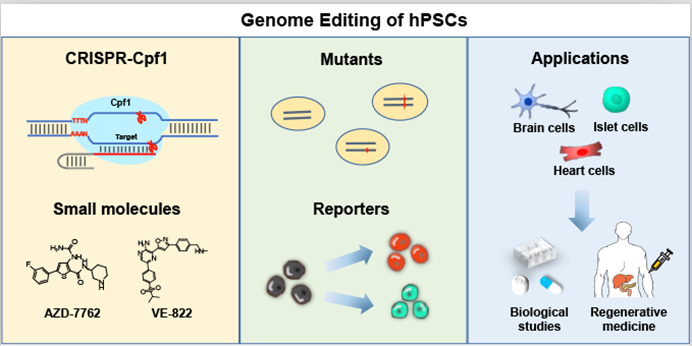On April 3, 2018, Dr. Saiyong Zhu’s Laboratory published a research paper entitled “Small molecules promote CRISPR-Cpf1-mediated genome editing in human pluripotent stem cells” on Nature Communications. This study provides a simple and efficient strategy for precise genome engineering and can accelerate the development of innovative approaches for treating human diseases.
Human pluripotent stem cells (hPSCs) have potential applications in biological studies and regenerative medicine. However, precise genome editing in hPSCs remains time-consuming and labor-intensive. The unique properties of CRISPR-Cpf1, including shorter crRNA length and low off-target activity, are very attractive for many applications.This paper demonstrates that the recently identified CRISPR-Cpf1 can be used to efficiently generate knockout and knockin hPSC lines. Particularly, Dr. Zhu’s group developed an unbiased drug-selection based platform feasible for high throughput screening in hPSCs and this screening system enabled them to identify small molecules VE-822 and AZD-7762that could promote CRISPR-Cpf1 mediated precise genome editing. Significantly, the combination of CRISPR-Cpf1 and small molecules holds great potentials in many applications, including disease modeling, drug discovery, and regenerative medicine.

The combination of CRISPR-Cpf1 and small molecules can promote precise genome editing in hPSCs and holds great potentials in biological studies and regenerative medicine
Ph.D. studentXiaojie Ma in Dr. Zhu’s group is the first author. Dr. Zhu is the corresponding author of this article. This work was funded by the national key research and development programme of CHINA (2016YFC1305300), the outstanding youth fund of Zhejiang Province (R17C120002), and the funding from Zhejiang University (172210171). Dr. Zhu is a scholar of the National 1000 Young Talents Program.



